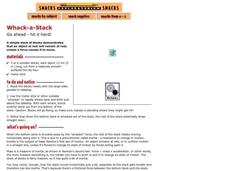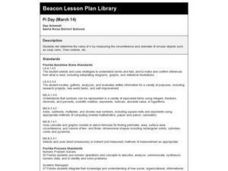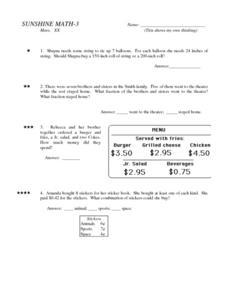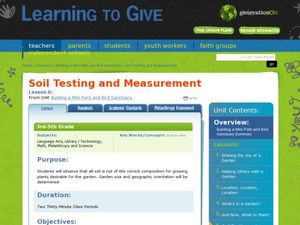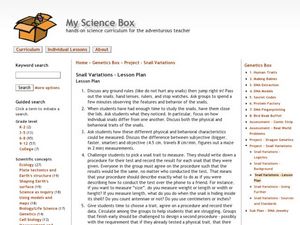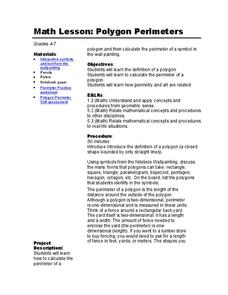Exploratorium
Eddy Currents
Make electromagnetic eddy currents evident with this demonstration. You will need to gather a few materials from the local hardware store and a strong neodymium magnet, but the visual value is well worthwhile.
Exploratorium
Corner Reflector
If you set up a triad of mirrors into a corner figuration, they act as a kaleidoscope, bouncing light waves back and forth indefinitely, changing the light that your eyes perceive. Although the materials required are very specific and...
Exploratorium
Touch the Spring
Concave mirrors and the images they produce are traditional topics in the physics classroom. This resource explains how to set up an investigation of them, and it provides you with the explanation of concepts.
Exploratorium
Bernoulli Levitator
Two versions of this activity are presented for you to choose from when teaching about Bernoulli's principle in your physical science class. One is a hands-on activity, while the other would be best used as a demonstration during...
Exploratorium
Whack-a-Stack
Go wild as you hit a stack of wooden blocks to demonstrate Newton's first and second laws of motion. The blocks at the top of the stack stay put as you knock one at a time out of the bottom. Note, however, that you will need to visit a...
Exploratorium
Marshmallow Puff Tube
Let physical science stars experience Newton's first law of motion by blowing marshmallows out of cardboard tubes! Using different lengths of tubing, they find that more force is needed to overcome increasing friction, and they have a...
West Contra Costa Unified School District
Talking About Distance, Rate and Time
Connect the tortoise and the hare fable to mathematics. Learners first identify key terms related to distance, rate, and time. They then solve distance/rate/time problems using different representations.
Mr. E. Science
Motion
An informative presentation covers motion, metric system, conversions, graphing of coordinates and lines, speed, velocity, and acceleration problems, as well as mean calculations. This is the first lesson in a 26-part series.
Chicago Botanic Garden
Climate Change Around the World
Look at climate change around the world using graphical representations and a hands-on learning simulation specified to particular cities around the world. Using an interactive website, young scientists follow the provided directions to...
101 Questions
Styrofoam Cups
How many cups does it take to reach the top? Learners attempt to answer this through a series of questions. They collect dimension information and apply it to creating a function. The lesson encourages various solution methods and...
Curated OER
Printable Paper Rulers
In this math resource worksheet, students can print out paper rulers. They choose between 20 different rulers that are different widths, and are delineated with standard or metric measurements.
Curated OER
Pi Day (March 14)
Fourth graders determine the value of ? by measuring the circumference and diameter of circular objects such as soup cans, Oreo cookies, etc..
Curated OER
Sunshine Math-3
In this math problem solving learning exercise, students examine and solve 8 math word problems that require them to use problem solving skills.
Curated OER
Present Perfect in Context
In this present perfect tense worksheet, students identify the tense used in the sentences indicated by the context. Students complete 6 problems.
Curated OER
Grade 3 Math-Advanced 5
In this grade 3 math worksheet, 3rd graders answer a set of 20 'advanced' multiple choice questions covering a variety of concepts. Answers may be checked online.
Curated OER
Medieval Millions
This PowerPoint enables students to review mathematical concepts that were addressed in fifth grade. This is an interactive review game where the class is divided into two teams. The team that answers the most questions right wins. Each...
Curated OER
Geometry: Area Project
Sixth graders identify and use area formulas for finding the area of geometric shapes.
Curated OER
Polygon Perimeters
Learners define the terms polygon and perimeter to begin the lesson. Using a calculator, they practice determining the perimeter of various symbols in a painting. They discuss how geometry and art are related to one another.
Curated OER
Collecting Data and Graphing
Young scholars practice collecting and graphing data using interlocking cubes. In this graphing lesson plan, partners count cubes and graph them. They also use a meter stick to measure arm span and height then compare the results with...
Curated OER
Soil Testing and Measurement
Students prepare their garden plot. In this gardening lesson, students use the Internet or book on plants to make sure the plants they have selected will be able to grow in their garden. The students assess and mark out the garden...
Curated OER
My Science Box
Students investigate snails and their physical and behavioral characteristics. In this investigative lesson students create a pie chart to show the results of their findings.
Curated OER
Polygon Perimeters
Students complete worksheets where they calculate the perimeter of polygons. In this perimeter of polygons lesson plan, students divide complex shapes into simple shapes to find the perimeter.
Curated OER
Partial Products
Third graders study partial-products algorithms. In this math lesson, 3rd graders use an algorithm to find the product of factors. Students discuss the relationships between multiplication and division.
Mrs. Glosser's Math Goodies
Circumference & Area Worksheet 1
Don't stress about creating your own problems and use this series of circumference and area worksheets. The problems ask pupil to plug diameter and radius into the formula to solve for area or circumference. The problems also have...






